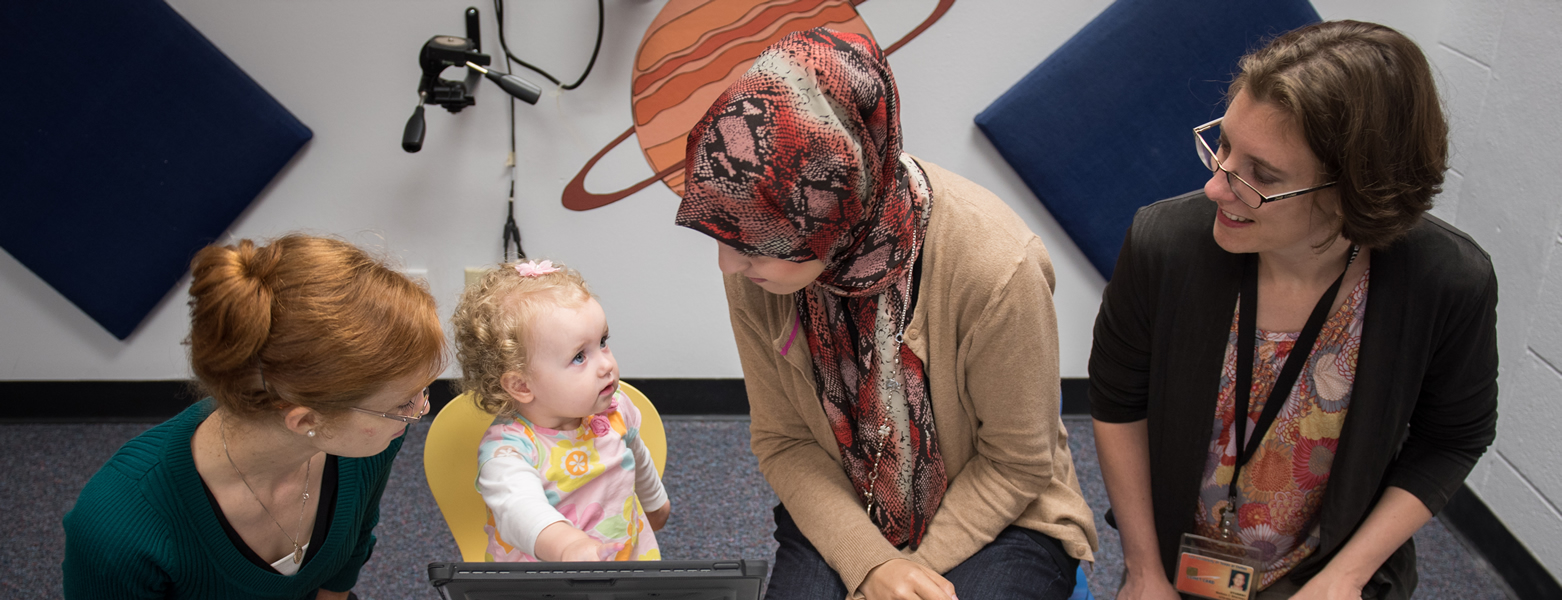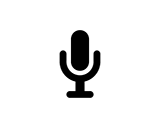Speech, Language, and Hearing Sciences PhD

PhD Professional Development Session
PhD Program Reflection and Feedback: An Open Conversation
In-Person only event
Date: Friday, December 5, 2025
Time: 12 – 1pm
Location: CD A229 (Callier Dallas)
The PhD degree offers advanced study for students pursuing a research career in academic, industry, government or other laboratory settings
The PhD program in Speech, Language, and Hearing Sciences (SLHS) offers advanced study and research training for students who will become leading scientists and scholars. Research in the program concerns all aspects of human communication including studies of speech, language, and hearing in individuals with and without communication disorders.
As part of training the next generation of scientists in speech, language, and hearing, the SLHS PhD program offers the opportunity for additional specialization in allied fields (e.g., cognitive neuroscience, systems neuroscience, psychology, and engineering). There are also opportunities for collaborative training at the UTSW Medical Center. State-of-the-art research and clinical facilities are housed in both the urban and suburban Callier Centers for Communication Disorders. The Callier clinics see over 4000 different patients annually and thus afford the opportunity for training in clinical and translational research. PhD students are fully funded for up to 5 years, with training that incorporates research milestones, including opportunities and support for extramural grant proposals. UTD boasts a supportive and inclusive environment for students and faculty, as well as opportunities to conduct research incorporating diverse populations and themes.
Doctoral students in the SLHS program work closely with their research mentors and other faculty throughout the School of Behavioral and Brain Sciences (BBS) to tailor their research experiences and course selections to ensure optimal preparation in their areas of interest. Areas of doctoral study encompass the physiological, neurological, and psychological aspects of communication as well as the identification, treatment, and prevention of developmental and acquired communication disorders. SLHS is integrated with the Callier Center for Communication Disorders, with the Callier Clinical Research Center providing a link across research and clinical arms. This relationship affords the implementation of a wide array of clinical and translational research projects. Our close relationship with UT Southwestern Medical Center also allows for close clinical collaboration with medical colleagues.
Areas of programmatic strength include the neurobiology of language, speech, and hearing; assessment methods and diagnostic markers of communication disorders; and innovative treatments and technological supports for people with communication disorders. Within these broad areas, specific research opportunities cover the breadth of the field including basic, clinical, and translational research related to autism, developmental language disorder (DLD), motor speech disorders in children and adults, language learning and poverty, language production and music, brain disease and semantic memory, voice disorders, noise- and drug-induced hearing disorders, tinnitus, hyperacusis and auditory rehabilitation using wireless listening devices, hearing aids and cochlear implants.
Students in the doctoral program benefit from the school’s rich intellectual climate, including weekly lectures and research presentations by students, faculty and visiting scholars. BBS hosts an annual colloquium series presented by internationally known scientists. In addition, the school’s centers and programs offer diverse symposia and workshops that are freely available to doctoral students. All events are posted on the BBS events page. SLHS students routinely attend the Callier Center Friday Seminars in Speech, Language, and Hearing (FLASH), which offers doctoral students the opportunity to gather with faculty, post-doctoral scholars and clinicians to present research at all phases of development and to learn from scientists exploring diverse speech, language, and hearing topics.
Facilities
The SLHS PhD program is housed within exceptional research facilities at the Callier Center for Communication Disorders, which has locations on both the Richardson campus and in Dallas adjacent to the UT Southwestern Medical School campus. Both Callier Center locations house state-of-the-art laboratories for behavioral, kinematic, neurophysiological, and neuroimaging studies of speech, language, and hearing in typical and clinical populations of all ages. The Callier Clinical Research Center provides additional core research space and equipment that is available to be reserved for faculty and student research projects.
Each year, the Callier Center serves more than four thousand patients with speech, language or hearing disorders, and Callier-Dallas is home to a nationally accredited child development program for infants and preschoolers. Via an active Research Participant Registry, scientists are provided access to participants within the normal range of function and participants diagnosed with speech, language, hearing, or other disorders affecting communication ability.
Through partnerships with area hospitals and clinics, as well as collaborative arrangements with the UT Southwestern Medical Center, SLHS doctoral students have additional access to laboratories equipped for studies of the neuroanatomical, neurophysiological and neurochemical bases of hearing and access to additional participant populations.
Degree Requirements
Program completion typically takes four to five years.
All PhD students are required to complete a minimum of 75 semester credit hours beyond the baccalaureate degree. Students in the SLHS PhD program complete a proseminar with other BBS PhD students, research design and analysis coursework, and doctoral seminars that provide comprehensive exposure to methods and questions within speech, language, and hearing areas. In addition, SLHS students complete doctoral seminars in speech, language, and hearing as well as neuroscience, psychology, or child development courses where additional methodological or theoretical training is relevant. The SLHS curriculum helps students not only obtain deep knowledge within their dissertation area but also broadly prepare for multi-disciplinary research and collaboration through exposure to the breadth of the profession.
During the first two years of the program, each student works closely with the faculty mentor in designing and completing an empirical research project and preparing a manuscript for peer review. In the third year, students advance to PhD candidacy by successfully defending a proposal for their dissertation, an independent and original research project conducted under faculty supervision. Students also complete a grant writing course and prepare a research grant during the third year. Successful public defense of the completed dissertation during year 4 or 5 is the final step in attaining the doctoral degree.
The UT Dallas graduate catalog provides information on degree requirements for the PhD program in SLHS and the PhD student guide provides additional detailed information. For questions about degree requirements, please contact slhs.phd@utdallas.edu. The university’s course look-up site, CourseBook, describes some of the program’s specific courses. The Office of Graduate Studies provides information on academic and other policies.
Admissions
The PhD in Speech, Language, and Hearing Sciences is a research degree. It is essential that there is a close match between a student’s research interests and the faculty’s expertise. Prospective students should contact faculty with whom they might share research interests. The SLHS admissions committee evaluates applications based on the personal statement, letters of recommendation, prior research and professional experiences, prior GPA, commitment to scholarship, and the availability of faculty mentoring in the stated area of interest.
Completion of an undergraduate degree in a related major is often helpful but is not required. Completion of a clinical degree (e.g., master’s degree in Speech-Language Pathology, Doctor of Audiology) is not required. Students who are currently enrolled in UTD AuD or SLP MS programs should consult with both their AuD or SLP program head and the PhD program head regarding application to the PhD program after completion of clinical experiences.
Students who enter the PhD program and later decide they wish to pursue clinical education will need to consult the AuD or SLP program head regarding the admissions process; the clinical education programs are highly competitive. PhD students may need to take a leave of absence from the PhD program during clinical foundation years and full-time clinical assignments (e.g., the CFY).
The Application Deadline is December 1
Please see the graduate admission page of the UT Dallas Office of Admission and Enrollment for details on how to submit an application to the PhD program in Speech, Language, and Hearing Sciences.
Completed applications must be received on or before December 1 for admission the following fall. SLHS does not have spring or summer admissions.
Applications to the PhD program must include official transcripts, three letters of reference from people qualified to evaluate your potential for successful doctoral study, and a statement of purpose detailing your previous research and professional experiences, your current research interests and your career goals. Applicants who wish to be considered for the BBS Scholars Award are required to submit an additional essay.
International applicants must provide proof of English proficiency via TOEFL, IELTS, or PTE meeting university minimum requirements. See the list of countries that are exempt from this requirement.
You can check the status of your application using the University’s Orion program.
Questions about the application process can be directed to:
Speech, Language, and Hearing Sciences Doctoral Program
School of Behavioral and Brain Sciences
The University of Texas at Dallas
800 W. Campbell Rd., GR41
Richardson, TX 75080
slhs.phd@utdallas.edu
Financial Aid
Financial support of full-time doctoral students enrolled in the SLHS PhD program is awarded through teaching or research assistantship stipends and tuition scholarships. Admitted students are automatically considered for these sources of financial aid. In addition to the salary and tuition and fee scholarship, UT Dallas will provide the cost of health coverage purchased through the university student health insurance program.
Other information on financial aid for graduate students is available on the UT Dallas graduate admissions page.
Funding & Awards
SLHS students complete a grant writing course and write a grant as part of their PhD program. SLHS students have been successful in obtaining external funding.
SLHS students routinely present their research at conferences and many SLHS students have received awards in recognition of their meritorious research.
Frequently Asked Questions (FAQ)
Is Financial Aid Available for PhD Students?
Financial support of full-time doctoral students in speech, language, and hearing sciences is awarded through teaching or research assistantships which include a monthly stipend and a tuition waiver. Admitted students are automatically considered for these sources of financial support. Please see the UT Dallas Graduate Admissions site for information on other sources of financial aid for PhD students.
What is UT Dallas Like?
The University of Texas at Dallas is one of the top 30 in the nation for ethnic diversity. Total enrollment at UT Dallas is approximately 30,000, with more than 8,000 graduate students. UT Dallas’ main campus is in Richardson, Texas, about 15 miles north of downtown Dallas; some of the centers affiliated with UT Dallas are located in Dallas, near the campus of the UT Southwestern Medical School. Both Richardson and Dallas are vibrant communities, with opportunities for art, drama, music, athletics and other activities. Visit the UT Dallas visitors website for more information about the University.
What are Richardson and Dallas Like?
Richardson and Dallas are diverse cities located in one of America’s largest and fastest growing metropolitan areas. The Dallas area boasts 50,000 acres of public park land, the nation’s largest urban arts district with excellent symphony, opera, and art museums, five professional sports franchises, multiple entertainment districts, and a thriving culinary scene. The Dallas Area Rapid Transit (DART) rail system runs from the suburbs of Plano and Richardson to the arts district, downtown Dallas, and DFW airport. Yes, it is hot in the summer, but the average daily temperature is 65 degrees (spring, fall, and winter are great!). The area offers a reasonable cost of living and an abundance of sunshine.
Where Should I Live?
Some doctoral classes are held on the main UT Dallas campus in Richardson; other classes may be held in Dallas, at the Callier Center for Communication Disorders, the Center for Brain Health, or the Center for Vital Longevity. Your duties as a teaching assistant or research assistant may take place on the main campus in Richardson or at one of the centers in Dallas, and locations of classes and duties may change over semesters.
Many students choose to live in areas between Richardson and Dallas for easy access to both Richardson and Dallas facilities. Public transportation is available, but most students find a car to be extremely helpful.
Student housing is available on the main campus in Richardson, including apartments that are available to both undergraduate and graduate students and limited family housing for students with spouses and children. You can use online search engines to find housing options that fit your price range and target location. The program office can also provide information and recommendations from current doctoral students.
What is the Admissions Process Like?
Applicants are strongly encouraged to contact potential mentors before applying. The fit between the research interests of the applicant and faculty – and the willingness and ability of the proposed mentor or mentoring team to accept new PhD student supervision responsibilities – is very important for the success of the applicant within any graduate program. In addition, the admissions committee evaluates applications on several dimensions, including prior GPA, letters of recommendation and personal statements.
Completed applications are reviewed by the admissions committee in December, and interviews are scheduled in January and/or February. Interviews may be scheduled via a video conferencing platform. Admissions decisions are made based on application materials, interviews, input from potential mentors, and availability of funding. Students offered admission to UTD are invited to visit UT Dallas to meet with prospective faculty mentors and to tour the facilities. Remote open house events are also used as needed to provide information to applicants.
Should I Contact Faculty Members with Whom I Would Like to Work Before I Apply?
Yes. We strongly encourage you to identify faculty who share your research interests and to contact them about current opportunities for admission.
When are Admissions Decisions Made?
Admissions decisions are made mid- to late February.
How Big is the PhD Program and How Many PhD Students are Accepted Each Year?
Around 25 to 30 students are typically enrolled in the speech, language, and hearing sciences PhD program at any one time. The number of students admitted each year varies as a function of student interests, mentor availability, and funding for student support.
What is the Background of a Successful Applicant (Minimum and Average GPA, In-Field Major, Research Experience, Etc.)?
Although many students have a background in speech, language, and hearing sciences, the program welcomes students from a variety of related fields including psychology, linguistics, biology, and engineering. Some students enter directly from their undergraduate program, while others join following completion of a masters degree or clinical doctorate, or after several years of professional experience.
What are Typical Outcomes from Graduates from the Program?
Our graduates are prepared to advance the field within diverse work settings. Over the last seven years, SLHS graduates have gone on to post-doctoral, tenure-track, or clinical or research faculty positions at universities, hospitals and industry settings.
What Makes this Program Unique?
Our Speech, Language, and Hearing Science PhD program is physically housed in the renowned Callier Center for Communication Disorders, which has locations in Richardson and Dallas. The Callier Center houses state-of the-art research space in addition to its comprehensive patient care facilities and classroom and conference spaces. Together, our doctoral program offers rich opportunities for collaboration with clinicians committed to evidence-based patient care and a large cohort of clinician scientists interested in normal and disordered speech, language, and hearing. In addition to dedicated laboratories managed by principal investigators with diverse interests, PhD students have access to fully equipped Research Core facilities and receive training with diverse technologies housed in the Callier Clinical Research Center (CCRC). Recruitment of participants is facilitated by the CCRC research registry, which automatically registers all Callier patients for recruitment into relevant research studies (with an opt-out option for patients who do not wish to be contacted).
Faculty associated with the Speech, Language, and Hearing Science PhD program are outstanding mentors who help students develop individualized educational programs consistent with their overall interests and goals. Faculty mentor student publications and student grants as part of the PhD program milestone plan.
The School of Behavioral and Brain Sciences is unique in its multi-disciplinary integration of Neuroscience, Psychology, Child Development, and Speech, Language, and Hearing. This combination facilitates unique expertise, such as in the neurobiology of speech, language, and hearing and the psychosocial impact of communication disorders, and lifespan brain and behavioral development. Students enrolled in the PhD program in speech, language, and hearing sciences routinely complete doctoral coursework associated with the graduate programs in cognition and neuroscience and psychology and often have mentors from these programs who contribute to breadth of experience. Students can study communication disorders using the techniques and instrumentation of cognitive neuroscience and developmental psychology, and work with bioengineers in the development of assistive technology.
Should I Apply for the SLP Master’s Program, AuD Program, or the PhD Program?
The SLP master’s degree and AuD programs provide clinical training for certification and licensure in the professions of speech-language pathology and audiology. The PhD program provides research immersion for students who are interested in academic and other research careers in speech, language, and hearing sciences. The PhD degree at UT Dallas is not an advanced clinical degree.
Students who are enrolled in MS or AuD clinical education programs often become interested in academic or research careers as they learn the current boundaries of clinical knowledge. Students enrolled in clinical degree programs are eligible to apply for admission to the PhD program after completion of core clinical coursework and should contact the PhD program head for additional information. Applicants who have completed clinical education prior to PhD program admission are encouraged to apply.
Do you require the GRE?
The GRE is not required for admission to the Speech, Language, and Hearing Sciences PhD program. If you have taken the general GRE already, you are welcome to send that information to us when you apply, but it is not required.
Program Contacts
Program Head
Program Mailing Address
Speech, Language, and Hearing Sciences Doctoral Program
School of Behavioral and Brain Sciences
The University of Texas at Dallas
800 W. Campbell Rd., GR41
Richardson, TX 75080
slhs.phd@utdallas.edu
PhD Student Guide
The PhD student guide provides information on policies and procedures in the PhD programs in the School of Behavioral and Brain Sciences.
PhD Student Forms and Information
Forms and Information
Degree Plan
Speech, Language, and Hearing Sciences
Registration and Related Forms
Graduate Change of Program
Register, Add, Drop, Withdraw
Repeated Course Grade Adjustment
Transfer of Credit Request
Milestones and Annual Reporting Forms
Milestones Agreement Form
Speech, Language, and Hearing Sciences Annual Report
Doctoral Student Feedback Form
Request for Extension
Year 1 Prospectus
Year 1 Proposal
Year 2 Project Manuscript Proposal
Grant Application
Public Presentation of Research Project
Dissertation
Committee Appointment Form
Dissertation Proposal Meeting
Public Presentation of Dissertation Proposal
Request for Final Oral Exam
Priority Deadlines FAQs
Memo – Absent Committee Member
Memo – Committee Member Attending Remotely
Checklist for Final Submission of Doctoral Dissertation
UTDPP1052
Teaching and Research Assistantship Forms and FAQs
UTDPP1075
Requests for Student Travel and Dissertation Support
Student Request for Travel Support
PhD Research Small Grants Program Application
Program Resources
Please visit the Office of Graduate Studies for additional information on academic policies, PhD deadlines, PhD forms, guidelines for preparing dissertations, and a profile of characteristics of doctoral programs at UT Dallas.






